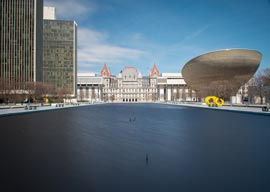
February 19, 2015

New York State Plaza, Albany
Source: Shutterstock
Local headlines here in New York State recently have been dominated by corruption in the state legislature. The speaker of the lower house, the State Assembly, has had to resign his position after being arrested last month on federal corruption charges.
The arrest was deeply unsurprising. Assembly Speaker Sheldon Silver was known for years to have been taking a retainer from the personal-injury law firm Weitz & Luxenberg, big names in the asbestos litigation business. No one knew the size of the retainer; but the speaker controls what legislation comes up before the Assembly, and”surprise!”tort reform was never on the docket.
We didn”t know the half of it. Silver’s been running a real-estate scam too, and packed state court judgeships with his placemen. This guy is a major player, a brilliant gamer of both the legislative and judicial systems governing the lives of 20 million people. He’s not the only one, either. More than 30 state pols have been arrested, indicted, or forced out of office these past 10 years. New York State government is a sewer.
The state’s voters seem fine with that: Silver was reelected last November with under 12,000 votes in a district with 120,000 residents, at least half of them eligible to vote. State-government-wise, the great majority of New Yorkers support the Apathy Party.
At least our politicians come cheap, though. Silver has made either four million or seven million dollars from his schemes, depending on your source, across 20 years. As corruption goes in the world, that’s pocket change.
Take China, for example. From last week’s Economist:
In the past few months extraordinary revelations have appeared in the Chinese media about corruption in the highest ranks of the People’s Liberation Army (PLA): a deputy chief of logistics built a mansion for himself modelled on the Forbidden City (among his treasures was a statue of Mao Zedong, in gold); the country’s most senior uniformed officer had a basement stacked high with cash; and in January it emerged that no fewer than 15 generals, including a former deputy chief of the nuclear arsenal, were being investigated for graft.
At least so far we haven”t heard that Silver (a Democrat) has a gold statue of FDR in his parlor.
Those Army scandals are in a fine old Chinese tradition. In the summer of 1834 Britain’s envoy Lord Napier was at Guangzhou, far from the imperial capital, trying to get a trade deal with China. That whole southern region of the empire was ruled by a viceroy named Lu Kun, a direct report to the emperor.
Rumors reached the court in Beijing that this viceroy was being paid off by local merchants to turn a blind eye to opium smuggling, which indeed he was. The emperor accordingly sent to Guangzhou three censors”high mandarins charged with enforcing proper Confucian ethics in the imperial bureaucracy. The censors squeezed the viceroy, to such effect that when they headed back north to clear the viceroy’s name to the emperor, the price of gold in South China had risen 3¾ percent.
In the first puritanical vigor of Mao Tse-tung’s New China these ancient practices were frowned upon, but by the time I got there in the early 1980s, they were reasserting themselves. For my Chinese friends and colleagues, dealings with officialdom were conducted via favor-trading and bribes. “Going through the back door,” it was called.
Communist Party officials hated foreigners knowing about this. On one memorable occasion I was trying to show off my command of Chinese colloquialisms to some colleagues within earshot of our unit’s Party secretary. Foolishly, I uttered the phrase “back door.” The secretary, an illiterate oaf named Dong, exploded in fury. “There’s no such thing as this “back door”!” he bellowed. “It doesn”t exist!” I can see the fat fool now, veins popping with fake indignation, my colleagues cowering. “Bu cunzai! Bu cunzai!” [“It doesn”t exist!”]
Corruption is the normal way of doing things over most of the world. I”m told that Africa is even worse than China; although, since Africans cannot create wealth, other than by digging it out of the ground, the pickings are slimmer.